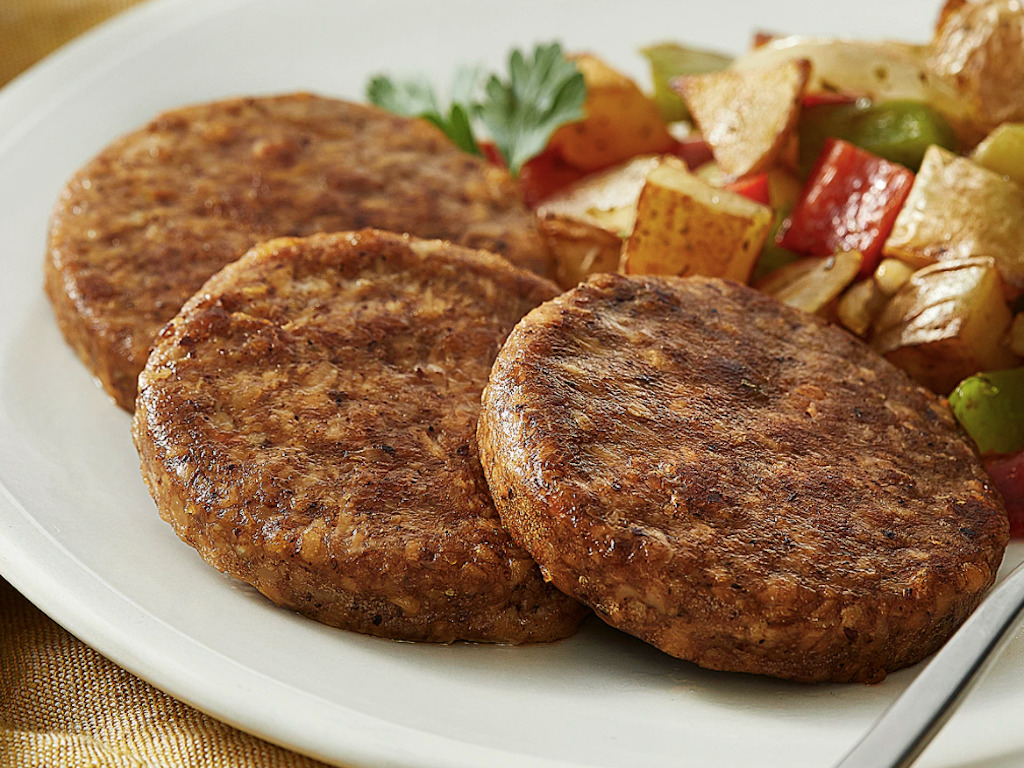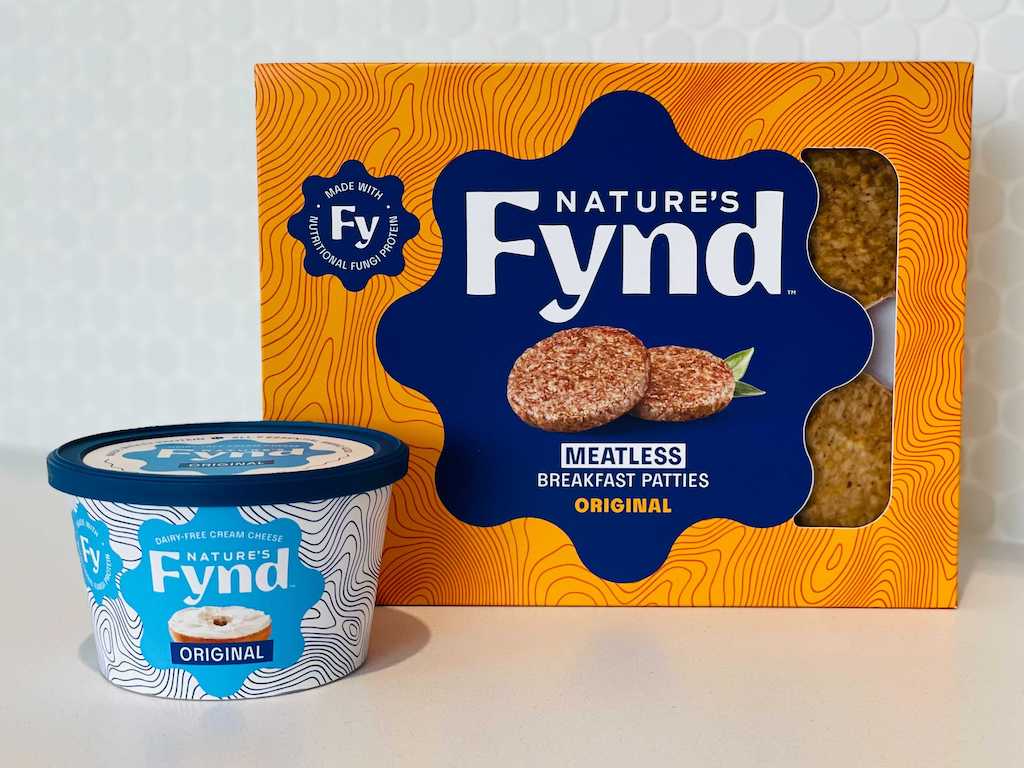How Nature’s Fynd Is Turning Geyser Goo Into Vegan Meat and Cheese
5 Mins Read
There are a lot of interesting ingredients making their way into the vegan meat and cheese categories. But Nature’s Fynd may just have the most interesting one of all.
As the meat, seafood, egg, and dairy categories change—namely becoming all-encompassing “protein” categories instead—the diversity in protein sources has never been more eclectic. Case in point: Nature’s Fynd. The Chicago-based startup that’s earned backing from Jeff Bezos and Bill Gates is best known for its core ingredient: a microbe that’s found deep inside Yellowstone National Park geysers.
To be clear, Nature’s Fynd isn’t dredging America’s favorite summer vacation spot to make meat and cheese. It’s cultivating the park’s microbes in a factory through a process called biomass fermentation.
“Our proprietary liquid air interface fermentation technology is a unique type of biomass fermentation where we grow biomass on top of a liquid surface rather than submerged in the liquid or on top of a solid,” Karuna Rawal, Nature’s Fynd CMO explains to Green Queen via email.

“This approach offers numerous advantages including increased growth rates, naturally separated biomass from the feedstock,” which Rawal explains is normally a very expensive and resource-demanding process. Chief among the benefits are improved texture and nutritional boosts. But it’s better for the planet, too. Biomass fermentation uses 99 percent less land, 99 percent less water, and emits 94 percent fewer greenhouse gases than processing traditional beef.
And if the company can scale, which it aims to do quickly with its recent funding rounds totaling more than $350 million, and earning it unicorn status, it could put a significant dent in the livestock industry, where traditional beef and dairy are key drivers of greenhouse gas emissions.
Displacing animal products
Livestock emissions are among the leading contributors to climate change, producing more emissions annually than aviation and maritime travel combined.
Scientists and medical experts continue to champion reducing animal products both as a healthier diet for the planet and for humans. According to Nature’s Fynd, its protein contains all nine essential amino acids, as well as key vitamins and minerals. Unlike animal products, Nature’s Fynd products are also good sources of dietary fiber and free from cholesterol and trans fats. And unlike a number of vegan meat and dairy brands, it’s low in sodium.
The brand also brings non-GMO certification—something leading vegan meat producer Impossible Foods can’t. Impossible Foods uses genetically modified soy to attain its meaty texture—a move that’s earned backlash from leading organic food advocates and organizations.

GMOs typically require heavy applications of herbicides and pesticides that have been linked to a number of health issues, including cancer. And unlike conventionally produced animal products, Nature’s Fynd is produced without antibiotics and hormones, which have also been linked to a host of health issues including metabolic and reproductive problems.
Although Nature’s Fynd is just now coming to market, the story begins in 2009, when Chief Sciences Officer and co-founder Mark Kozubal was a Ph.D. student doing research at Yellowstone National Park.
“The research was supported by the National Science Foundation and NASA to better understand how life thrives in adverse environments,” says Rawal. “Without harming the park environment, Dr. Kozubal collected samples from an acidic hot spring, and from it, isolated a remarkable microbe and later named it Fusarium strain flavolapis. The one sample is much like a sourdough starter, meaning no future visits to the park are needed.”
Fy Protein
That discovery sent Kozubal into the labs and then kitchens, to develop a number of products including the brand’s recently released sausage and cream cheese. The company calls the microbe-based protein Fy Protein.
Fy Protein doesn’t just deliver the animal-free protein and fiber that makes the products healthier than their counterparts, but it also delivers a structure to the end food product—something unique in the vegan food space.
Nature’s Fynd’s cream cheese could easily be mistaken for dairy—it’s spreadable, soft, and has a tang that some nut-based cream cheeses don’t often deliver. The sausages are dense, and like a traditional breakfast sausage patty, have the mouthfeel of pork-based sausages that brown and sizzle.
Nature’s Fynd products are vegan—unlike products made via precision fermentation, which uses specific microbes to create certain types of protein. Precision fermentation has been successful for Bay Area startup Perfect Day, which uses the technology to create dairy-identical microbes that it uses in milk, cheese, and yogurt products. But with dairy intolerances and allergies affecting such large percentages of the population—more than two-thirds of people of Asian and Black descent are at high risk for dairy allergies—there are limitations.

For Nature’s Fynd’s biomass fermentation, there’s the promise of a product that’s not just more tolerable—but safe, too.
“We have obtained self-affirmed GRAS status, under the FDA Guidelines, which means that our food ingredient is Generally Recognized As Safe. In December of 2019, a panel of independent experts convened to conduct an evaluation of our ingredient, Fy Protein, as the criteria for GRAS requires consensus among qualified experts that the data and information establish safe use in food and beverages. That expert panel unanimously concluded that Fy Protein is safe under the conditions of intended use in a wide range of food categories,” says Rawal.
The brand currently offers two types of cream cheese: Dairy-Free Original Cream Cheese, Dairy-Free Chive & Onion Cream Cheese, and two types of sausage patties: Meatless Original Breakfast Patties and Meatless Maple Breakfast Patties. But the brand says other products are already in the works, and it should be able to announce those sometime this year.
Lead image and all other photos courtesy of Nature’s Fynd.



